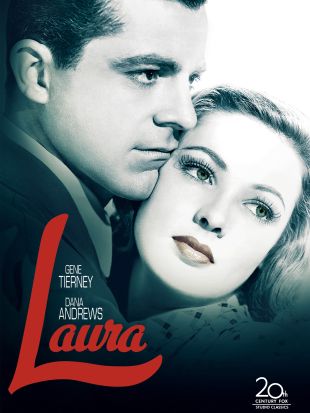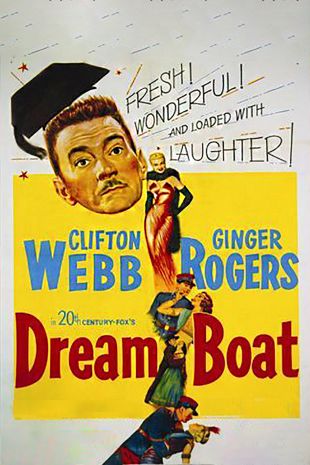Clifton Webb was the most improbable of movie stars that one could imagine -- in an era in which leading men were supposed to be virile and bold, he was prissy and, well, downright fussy. Where the actors in starring roles were supposed to lead with their fists, or at least the suggestion of potential mayhem befalling those who got in the way of their characters, Webb used a sharp tongue and a waspish manner the way John Wayne wielded a six-gun and Clark Gable a smart mouth, a cocky grin, and great physique. And where male movie stars (except in the singing cowboy movies) were supposed to maintain a screen image that had women melting in their arms if not their presence, Webb hardly ever went near women in most of his screen roles, except in a fatherly or avuncular way. Nevertheles, the public devoured it all, even politely looking past Webb's well-publicized status as a "bachelor" who lived with his mother, and in the process turned him into one of Hollywood's most popular post-World War II movie stars, with a string of successful movies rivaling those of Wayne, Gable, Humphrey Bogart, Gary Cooper, or any other leading man one cares to name. Indeed, Webb was for more than 15 years a mainstay of 20th Century Fox, his movies earning profits as reliably as the sun rising -- not bad for a man who was nearly rejected from his first film on the lot because the head of production couldn't abide his fey mannerisms.
Clifton Webb was born Webb Parmalee Hollenbeck, in Indianapolis, IN, in 1891 (his date of birth was falsified during his lifetime and pushed up by several years, and some sources list the real year as 1889). His father -- about whom almost nothing is known, except that he was a businessman -- had no interest in preparing his offspring for the stage or the life of a performer, a fact that so appalled his mother (a frustrated actress) that she packed herself and the boy off to New York, and he started dancing lessons at age three. By the time he was seven years old, he was good enough to attract the attention of Malcolm Douglas, the director of the Children's Theatre, and he made his Carnegie Hall debut in 1900 (when he would have been either seven, nine, or 11), playing Cholly in The Brownies. Webb was taking lessons in all of the arts by then, and in 1911, made his operatic debut in La Bohème. It was as a dancer, though, that he first found his real fortune -- seen at a top New York nightspot, he so impressed one lady professional that she immediately proposed a partnership that resulted in an international career for Webb.
Webb's acting wasn't neglected, either, and in the 1920s and '30s, he was regarded as one of the top stage talents in the country, a multiple-threat performer equally adept in musicals, comedies, or drama. Early in his career, he'd worked under a variety of names, finally transposing his first name to his last and reportedly taking the Clifton from the New Jersey town, because his mother liked the sound of it. Webb was a well-known figure on-stage, but his value as a film performer was considered marginal until he was well past 50 -- he'd done some film work during the silent era, but in the mid-'30s, he was brought out to Hollywood by MGM for a film project that ran into script problems. He spent a year out there collecting his contracted salary of 3,500 dollars a week and doing absolutely nothing, and hated every minute of it. Webb returned to New York determined never to experience such downtime again, and over the ensuing decade bounced back with hits in George S. Kaufman and Moss Hart's The Man Who Came to Dinner and Noël Coward's Blithe Spirit, doing the latter for three years. Ironically, the role of Sheridan Whiteside in The Man Who Came to Dinner was inspired by the real-life author/columnist Alexander Woollcott, who would also be the inspiration for the role that finally brought Webb to Hollywood successfully.
In 1943, 20th Century Fox set out to adapt a novel by Vera Caspary entitled Laura to the screen. The book, a murder mystery set in New York, had in it a character named Waldo Lydecker, who was modeled on Alexander Woollcott; a waspish, stylish, and witty author and raconteur, Woollcott was a well-known and popular media figure, who'd even done a little acting onscreen and on-stage. When it came time to cast the role, producer Otto Preminger and director Rouben Mamoulian decided to give Webb a screen test. Preminger was totally convinced of Webb's rightness for the role, and the screen test bore him out, but studio production chief Darryl F. Zanuck couldn't abide Webb's fey, effete mannerisms and obviously gay persona, and did his best to keep him from the role. Luckily, Preminger prevailed, and Webb -- in what is usually regarded as his real film debut -- proved to be one of the most popular elements of what turned out to be a massively popular movie. It was the beginning of a very profitable two-decade relationship between the actor and the studio.
Webb gave an Academy Award-caliber performance in Edmund Goulding's The Razor's Edge (1946), and in 1948 he became an out-and-out star, portraying Mr. Belvedere, the housekeeper and "nanny" hired by the harried parents (portrayed by Robert Young and Maureen O'Hara) in the hit comedy Sitting Pretty (1948). Beginning with Laura in 1944, each of the next 15 movies that Webb made was a success, and they included everything from comedies to some of the most intense film noir -- most notably The Dark Corner (1946), in which he played a murderer -- but the role of Mr. Belvedere proved to be so popular that it threatened to swallow him up. Webb flatly refused to do any sequel that did not meet with his approval, and only two ever did -- this even as he received thousands of letters from mothers seeking advice on raising their children.
The great unspoken irony in all of this was that Webb was not only unmarried and childless, but was as close to being openly gay as any leading actor in Hollywood could be -- he lived with his mother, and the two attended parties together, and was on record as being a "bachelor," which was code in those days (where certain kinds of actors were concerned) for being gay. And in an era in which this wasn't acceptable as a choice or a condition, audiences didn't care -- in a testimony to the sheer power of his acting, they devoured Webb's work in whatever role he took on. He never did a Western, but he did play a father of two children who unexpectedly rises to heroism in Titanic (1953), and he played the father of 12 children in Cheaper by the Dozen (1950); as he said when asked about the propriety of a childless, unmarried man playing a father of 12, "I didn't need to be a murderer to play Waldo Lydecker -- I'm not a father, but I am an actor." Webb was always stylishly dressed in public, and owned dozens of expensive suits -- he was, in many ways, the America's first pop-culture "metrosexual," and he made it work for two decades. The death of Webb's mother in 1960, reportedly at age 90, was an event from which the actor never fully recovered. Though he did a few more screen appearances, his health was obviously in decline, and he passed away in 1966.

/_9by13/_derived_jpg_q90_310x470_m0/Titanic1953-BoxArt.jpg)
